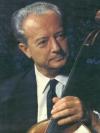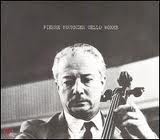Pierre Fournier (1906 – 1986)
/"The Artistocrat of Cellists"
"The Cellist of the Future." ~ Maurice Marechal, 1923.
"I do not know his superior among living cellists, nor any...who give one more profoundly the feeling of having been present at music-making." ~ Virgil Thomson, New York Herald Tribune.
Pierre Fournier was born in Paris 1906 and was the son of a French Army General. His mother was his first music teacher, teaching him piano but when he developed a mild case of polio, he could no longer use his legs and feet as effectively on the pedals and he turned his attention to the cello.
He was accepted into the Paris Conservatoire where he studied with André Hekking and later with Paul Bazelaire. He graduated age 17, 1923. Though young, he had tremendous virtuosity, and was famous for his bowing facility.
Pierre: "Paul, I wish I had your left hand." Tortelier replied, "Pierre, I wish I had your right arm!"
After playing with the Concerts Colonne Orchestra in 1925 he rose to fame and began touring all over Europe. During the following years he played with many of the most highly acclaimed, prestigious musicians of the time, and recorded the complete chamber music of Brahms and Schubert for the BBC on acetates. Unfortunately these deteriorated before the recordings could be transferred to digital. He is also praised for his recordings of the Bach suites (Beethoven-Saal, Hannover, December 1960), which are regarded even now, as some of the best versions ever made. His other discs include LPs ofBeethoven's cello sonatas and Elgar's Cello Concerto; these have long since been available on CD.
He was a teacher at the École Normale de Musique and the Paris Conservatoire from 1937 to 1949, teaching there during WWII. A few years after the war, in 1948, he toured theUnited States playing in New York and Boston and receiving great praise and acclaim. In 1956, he made his home in Switzerland, although he never relinquished his French citizenship.His son was a great pianist and they often performed cello/piano sonatas together. In 1963 he was made a member, and a year later an officer, of the French Legion of Honor.
He enjoyed modern music, as well as classical. Many modern composers wrote works for him, including Martinu, Martinon and Poulenc. As a teacher Fournier insisted that his students develop a smooth tone, and a high elbow for the right arm. He carried on teaching right up until his death in 1986. The British cellist Julian Lloyd Webber was among his pupils.
















